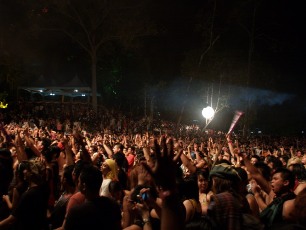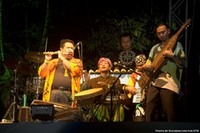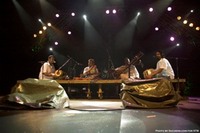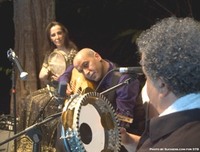by Mallika Naguran

What’s a Rainforest Festival without some rain?
That’s the attitude that got half the audience up on their feet, grooving at the 11th Sarawak Rainforest World Music Festival 2008. Squelching ankle-deep mud could not stop them, while the rest – families, locals, foreigners from around the world – picnicked on sheets and mats on drier grounds, enjoying the party atmosphere from afar.
After all, this was the time they had waited oh so impatiently to be at Sarawak where the magic of music uncurls. Torrential rain on the opening day after ten consecutive years of great weather marked a first; in fact, organizers considered it bad timing. It was very, very, very wet.
However, musician Jean Claude from Kasai Masai was of the mind that it was auspicious. “If you don’t mind, I will tell you that in Congo where we come from originally, it rains everyday. This is because of the equatorial rainforest which is a lot bigger that Sarawak’s. Let me tell you that we, performing here for the first time, have brought our rainforest spirit with us. It is no coincidence.”

Tuku Kame of Sarawak.
It is hardly coincidental that the event brought together diverse spirits and cultures to produce colliding sound waves.
Foreign bands, 12 of them, and five local groups, oozed non-stop wide-ranging sounds such as traditional, folk, fusion, Celtic, rock, Baul and Socca.
The performers were New Rope String Band (United Kingdom), Yakande (Gambia/Guinea), Pinikpikan (The Philippines), Adel Salameh (Palestine), Ross Daly Quartet (Greece), Fadomorse (Portugal), Kasai Masai (Congo), Hiroshi Motofuji (Japan), Oikyataan (India), Beltaine (Poland), Sheldon Blackman and The Love Circle (Trinidad & Tobago).
Malaysian bands were Akasha, Anak Jati Bisaya Orchestra, Kan’id, Senida and Tuku Kame.

Pinikpikan thumps through hearts.
Appreciating the spirit of the community, environment, even the wild, form part of Pinikpikan’s life values. Guitarist and group director Samy of Pinikpikan talked about whales being poached and killed, and his song Butan Ding renders this point. “It’s a huge beast, yet it is vegetarian, eating plankton. So why kill it?” he asked.
The eight-member band from The Philippines spread the message of whale protection with traditional musical instruments such as the tungatong (bamboo shaker), derbuka (drum) and kutyati (two-stringed instrument from Mindanao) with Western instruments through an eclectic mix such as Afro-Cuban, Arabic and Asian.

Hendrix reinvented with Akasha.
They were among the youngster favourites who also included Akasha (Malaysia), Beltaine, Kasai Masai and Sidney
Sheldon over the three-day concert from 11-13 July at Sarawak Cultural Village in Santubong. Taiko drummer Hiroshi Motofuji put on a pounding performance with a spread of drums, including the Indian mridhangam with mastery of interpretation.

Adel Salameh trio thrill.
Oud player Adel Salameh’s finger work held me in awe, accompanied by wild honey vocalist Naziha Azzouz, an Algerian. I especially enjoyed watching their unassuming drummer play expertly on the tambourine in the opening solo – a simple instrument we often take for granted – yet capable of soaring the spirit.
Photos by Foto Polo Singapore (www.travel-Malaysia.com) and Suchens.com for Sawarak Tourism Board.
Make plans now to attend the 12th Sarawak Rainforest Music Festival on 10-12 July 2009. Fringe events being planned in town, plus spend time at the world craft bazaar and folk art forum. Hotels get full during the event, so make plans early. And while you are in Sarawak, visit their many eco destinations.
Coming soon: recommended eco destinations in Kuching and Sarawak.